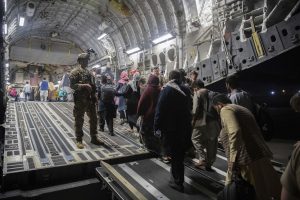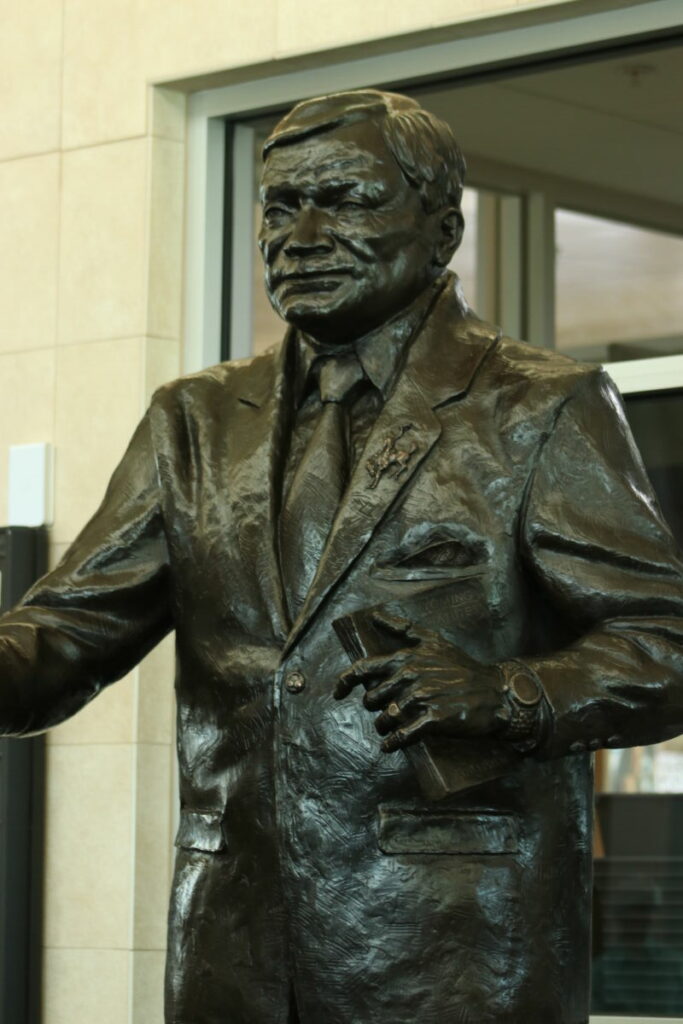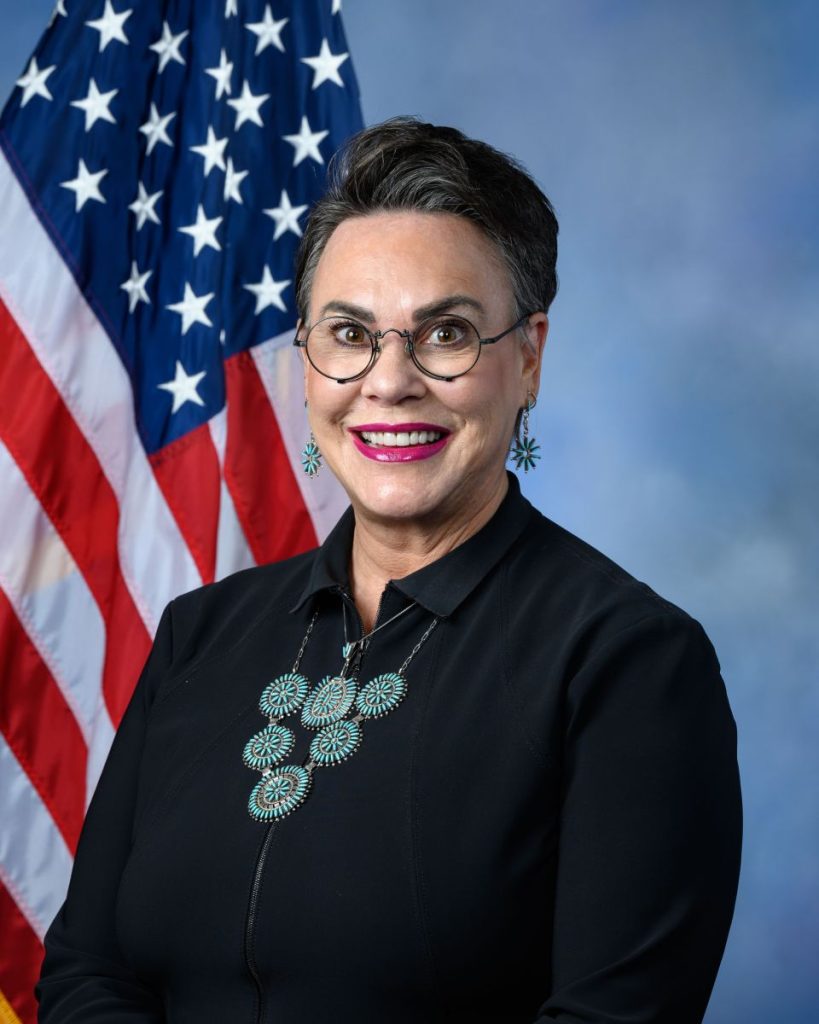Biden Blames Trump For Chaotic Afghan Withdrawal
Written by Associated Press on April 6, 2023

FILE – In this Aug. 22, 2021, file photo provided by the U.S. Air Force, Afghan passengers board a U.S. Air Force C-17 Globemaster III during the Afghanistan evacuation at Hamid Karzai International Airport in Kabul, Afghanistan. (MSgt. Donald R. Allen/U.S. Air Force via AP, File)
Biden review of chaotic Afghan withdrawal blames Trump
By ZEKE MILLER and NOMAAN MERCHANT Associated Press
WASHINGTON (AP) — President Joe Biden’s administration on Thursday laid the blame on his predecessor, President Donald Trump, for the deadly and chaotic 2021 withdrawal of U.S. troops from Afghanistan that brought about some of the darkest moments of Biden’s presidency.
The White House publicly released a 12-page summary of the results of the so-called ” hotwash ” of U.S. policies around the ending of the nation’s longest war, taking little responsibility for its own actions and asserting that Biden was “severely constrained” by Trump’s decisions.
It does acknowledge that the evacuation of Americans and allies from Afghanistan should have started sooner, but blames the delays on the Afghan government and military, and on U.S. military and intelligence community assessments.
The brief document was drafted by the National Security Council, rather than by an independent entity, with input from Biden himself. The administration said detailed reviews conducted by the State Department and the Pentagon, which the White House said would be transmitted privately to Congress on Thursday, were highly classified and would not be released publicly.
“President Biden’s choices for how to execute a withdrawal from Afghanistan were severely constrained by conditions created by his predecessor,” the White House summary states, noting that when Biden entered office, “the Taliban were in the strongest military position that they had been in since 2001, controlling or contesting nearly half of the country.”
The report does fault overly optimistic intelligence community assessments about the Afghan army’s willingness to fight, and says Biden followed military commanders’ recommendations for the pacing of the drawdown of U.S. forces.
“Clearly we didn’t get it right,” National Security Council spokesman John Kirby said Thursday, but sidestepped questions about whether Biden has any regrets for his decisions and actions leading up to the withdrawal.
Kirby said of the report that “the purpose of it is not accountability,” but rather “understanding” what happened to inform future decisions.
The White House asserts the mistakes of Afghanistan informed its handling of Ukraine, where the Biden administration has been credited for supporting Kyiv’s defense against Russia’s invasion. The White House says it simulated worst-case scenarios prior to the February 2022 invasion and moved to release intelligence about Moscow’s intentions months beforehand.
“We now prioritize earlier evacuations when faced with a degrading security situation,” the White House said.
In an apparent attempt to defend its national security decision-making, the Biden administration also notes that it released pre-war warnings over “strong objections from senior officials in the Ukrainian government.”
Republicans in Congress have sharply criticized the Afghanistan withdrawal, focusing on the deaths of 13 service members in a suicide bombing at Kabul’s airport, which also killed more than 100 Afghans.
Former Marine Sgt. Tyler Vargas-Andrews, who was badly wounded in the explosion, told a congressional hearing last month that the withdrawal “was a catastrophe” and “there was an inexcusable lack of accountability.”
The administration’s report appears to shift any blame in the Aug. 26, 2021, suicide bombing at Hamid Karzai International Airport, saying it was the U.S. military that made one possibly key decision.
“To manage the potential threat of a terrorist attack, the President repeatedly asked whether the military required additional support to carry out their mission at HKIA,” the report said, adding, “Senior military officials confirmed that they had sufficient resources and authorities to mitigate threats.”
Kirby credited U.S. forces for their actions in running the largest airborne evacuation of noncombatants in history during the chaos of Kabul’s fall.
“They ended our nation’s longest war,” he told reporters. “That was never going to be an easy thing to do. And as the president himself has said, it was never going to be low grade or low risk or low cost.”
Since the U.S. withdrawal, Biden has blamed the February 2020 agreement Trump reached with the Taliban in Doha, Qatar, saying it boxed the U.S. into leaving the country. The agreement gave the Taliban significant legitimacy and has been blamed by analysts for undercutting the U.S.-backed government, which would collapse so quickly a year later.
The Afghan government released roughly 5,000 Taliban prisoners after the Doha agreement as a condition of having peace talks with the Taliban. Kirby noted that release and other examples of what he said was a “general sense of degradation and neglect” inherited by Biden.
But the agreement also gave the U.S. the right to withdraw from the accord if Afghan peace talks failed — which they did.
The agreement required the U.S. to remove all forces by May 1, 2021. Biden pushed a full withdrawal to September but declined to delay further, saying it would prolong a war that had long needed to end.
Since the withdrawal, the U.S. carried out a successful operation to kill al-Qaida leader Ayman al-Zawahri — the group’s No. 2 leader during the Sept. 11 attacks — which the White House has argued is proof it can still deter terrorist groups in Afghanistan.
But the images of disorder and violence during the fall of Kabul still reverberate, including scenes of Afghans falling from the undercarriages of American planes, Afghan families handing infants over airport gates to save them from the crush and violence of the crowd, and the devastation after the suicide bombing at the Abbey Gate.
Pressed by reporters Thursday afternoon, Kirby repeatedly defended the U.S. response and effort to withdraw American citizens and argued with reporters who referred to the withdrawal as chaotic. At one point, he paused in what appeared to be an effort to gather his emotions.
“For all this talk of chaos, I just didn’t see it, not from my perch,” said Kirby, who was the Pentagon spokesman during the withdrawal. “At one point during the evacuation, there was an aircraft taking off full of people, Americans and Afghans alike, every 48 minutes, and not one single mission was missed. So I’m sorry, I just won’t buy the whole argument of chaos.”
Biden will not declassify portions of the report itself, Kirby said, citing the ongoing work of a bipartisan Afghanistan war commission and the sensitivity of the documents.
The release of the NSC review comes as the State Department and House Republicans battle over documents for classified cables related to the Afghanistan withdrawal. Last week, Rep. Mike McCaul, chairman of the House Foreign Affairs Committee, took an unprecedented step in subpoenaing Secretary of State Antony Blinken for a cable written by dozens of diplomats at the U.S. Embassy in Kabul shortly before the withdrawal.
The July 2021 communication reportedly warned Blinken about the potential fall of Kabul via a special “dissent channel,” which allows State Department officials to issue warnings or express contrarian views directly to senior agency officials.
—
AP writers Josh Boak, Ellen Knickmeyer, Seung Min Kim, Lolita C. Baldor, and Farnoush Amiri contributed from Washington.




